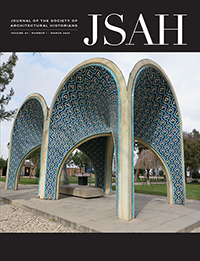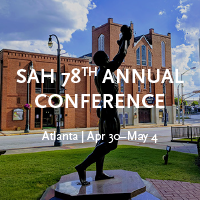Download PDF Statement
The Society of Architectural Historians (SAH), the oldest and largest scholarly organization devoted to studying the history of the built environment, strongly opposes the recently approved Florida “Resiliency and Safe Structures Act,”
passed in April 2024 by the Florida House (HB1317) and Senate (SB1346).
Florida legislators believed local preservation boards had grown too powerful, to the detriment of property owners, resulting in this new law. This law allows owners to demolish buildings in high-risk coastal flood zones when local officials determine the building or structure to be unsafe. In instances where the local government has jurisdiction, it also allows owners to demolish buildings in the same zones if the buildings do not conform to the base flood elevation requirements set forth by the Federal Emergency Management Agency (FEMA). The challenge is that few, if any, historic buildings meet FEMA’s current standards.
The law targets oceanfront buildings along the so-called coastal construction control line, a border created to delineate how close developers can build to the coast. In Miami Beach, the endangered historic properties are concentrated among the Miami Modernist (MiMo)-style resorts along Coins Avenue in the Mid Beach and North Beach neighborhoods. These include the Faena, Casablanca, Carillon, Sherry Frontenac, and Edison hotels, as well as a handful of Art Deco buildings in the South-of-Fifth neighborhood such as the Savoy Hotel. The new law effectively strips the Miami Beach Historic Preservation Board of its long-standing ability to determine whether these and other historic structures may be demolished and, if so, to ensure that elements of its design are preserved or replicated.
This was the second time Florida legislators tried to pass such a law. The initial effort failed last year after strong opposition from a broad coalition of local officials and preservationists. This time, the bills exempted St. Augustine, Key West, Palm Beach, Tampa, Pensacola, West Palm Beach and Panama City and Miami Beach’s Ocean Drive and the Art Deco District, as well as individual buildings such as the Fontainebleau Hotel. This iteration of the law appears to be aimed directly at Miami Beach. With the new focus on Miami Beach alone, and without a coalition of other impacted communities, the bills were passed into law.
In recent years, as sea levels continue to rise and hurricanes grow strong and more frequent, Miami Beach residents have pushed back on development. In November, Miami Beach voters elected a new mayor who vowed to “stop overdevelopment.” In 2022 referendums, Miami Beach voters rejected two proposals to redevelop city-owned properties into office and mixed-use developments, as well as the replacement project for the Deauville Hotel that was designed by architect Frank Gehry. Preservation efforts are inherently local: preservation regulations are almost always part of a municipality’s zoning regulations, and as such, are crafted by each locality to fit each communities wishes (including deciding not to include preservation stipulations in the local zoning regulations). This law circumvents the choices made by residents of Miami who expressed their opinion through the public process.
Statewide legislation, such as this new law, could be used nationally as a tool nationally to circumvent the choices made by local residents to protect historic resources by extending various levels of preservation protection. By way of legislation such as this, long-standing, popular local preservation efforts can be swept
away at the state level by well-placed lobbying efforts, with the residents of the affected communities afforded scant abilities to protect their choices, which they already made manifest through extensive public processes and the ballot box itself.
Development interests aim to sweep aside decades of popular local preservation efforts and the public processes which brought them about.
The Society of Architectural Historians (SAH), the oldest and largest scholarly organization devoted to studying the history of the built environment, strongly opposes the recently approved Florida “Resiliency and Safe Structures Act,”
passed in April 2024 by the Florida House (HB1317) and Senate (SB1346).
Bryan Clark Green, Ph.D., LEED AP BD+C
Preservation Officer and Chair,
Society of Architectural Historians Heritage Conservation Committee
Approved 5 August 2024.
Society of Architectural Historians Heritage Conservation Committee: Kenneth Breisch, Ph.D.; Anthony Cohn, AIA; Pushpita Eshika, Ph.D.; Yannick Etoundi; David Fixler, FAIA; Mohammad Gharipour, Ph.D.; Suha Hasan, Ph.D.; Priya Jain, AIA; Basak Kalfa; Theodore H. Prudon, Ph.D., FAIA; Deborah Slaton; Ben Thomas, Ph.D.; Members, SAH Heritage Conservation Committee.
Image: General exterior view of Barbizon Hotel (Henry Hohauser, 1937), located at 530 Ocean Drive, Miami Beach, Florida. Photograph by Peter Clericuzio, 2012.

